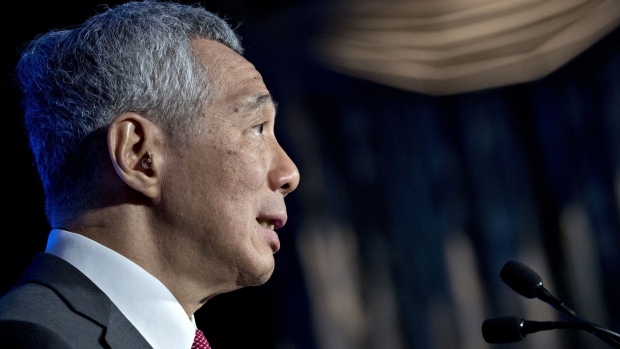Jun 29, 2020
Singapore Elections Kick Off With All Eyes On Lee Family Feud
, Bloomberg News

(Bloomberg) -- Singapore’s nine-day election campaign officially kicks off Tuesday with candidate nominations, and the big question enthralling the city-state is whether Prime Minister Lee Hsien Loong’s estranged brother will compete for a seat with the opposition.
Lee Hsien Yang, 62, announced last week he had joined the Progress Singapore Party in a bid to challenge his older brother’s ruling People’s Action Party, which has won every contest since independence in 1965. The siblings have sparred over the estate of their father, Singapore’s first premier Lee Kuan Yew, which has spawned other conflicts since his death in 2015.
“We must vote for change. We must create a first-world parliament to strengthen the DNA of collective leadership in Singapore,” Lee Hsien Yang said in a Facebook post Monday. “We need to vote for our future and for our children’s future, and not for past PAP glories.”
While Singapore doesn’t allow opinion polls, most analysts expect the PAP to easily win again. Still, any narrowing of its victory margin could reflect an erosion of confidence in its new generation of leaders, particularly regarding how they are handling the pandemic.
Campaigning ahead of the July 10 vote will likely be heated. The PAP’s election manifesto hails its ability to steer the country through the coronavirus crisis, while numerous opposition parties will surface issues such as the expected increase in the goods-and-services tax and retrenchment insurance.
Family Drama
Lee Hsien Loong, who turns 70 in 2022, has signaled his intent to make way for his successor, widely expected to be current Finance Minister Heng Swee Keat. While the prime minister has largely avoided government scandals since he took office in 2004, the family drama has been brewing in recent years. He said on Monday that the election isn’t about him or any family disputes, but about Singapore’s future at a critical juncture, according to the Straits Times.
The siblings have clashed over Lee Kuan Yew’s will, and in particular, his famous Oxley Road house. Lee Hsien Yang’s wife is in a legal tussle over accusations that she mishandled the will, and his son -- an assistant professor of economics at Harvard University -- faces a court charge for disparaging remarks about the judiciary that were posted on Facebook.
This will be the first election for the Progress Singapore Party, which was founded last year by former ruling party members who became disgruntled with the government. It has seen a surge in donations in recent days, with its leader Tan Cheng Bock -- a former PAP lawmaker and presidential candidate -- describing it as the “Lee Hsien Yang effect.”
“People must get away from that notion that his coming into this particular political journey is just to hope to talk more about what happened about Oxley and so on,” Tan said on Monday during a briefing. “It’s nothing to be connected to his family, because he believed in what we started out, our party.”
How a House Started Singapore’s First Family Feuding: QuickTake
Here’s what else to look out for today as candidates square off:
- The election will feature 31 electoral divisions being contested, comprising 14 single-member constituencies and 17 group representation constituencies, with a total of 93 members of Parliament returned.
- The constitution also ensures there will be 12 opposition MPs in Parliament after this election, compared to nine in the last legislature. If there are no opposition members elected, 12 non-constituency MPs will be chosen from the opposition candidates who have received the most votes.
- Five constituencies are expected to be hotly contested, mostly between the PAP and the Workers’ Party -- the main opposition force. The family feud could play out in the downtown constituency of Tanjong Pagar, which Lee Kuan Yew headed for six decades.
©2020 Bloomberg L.P.






